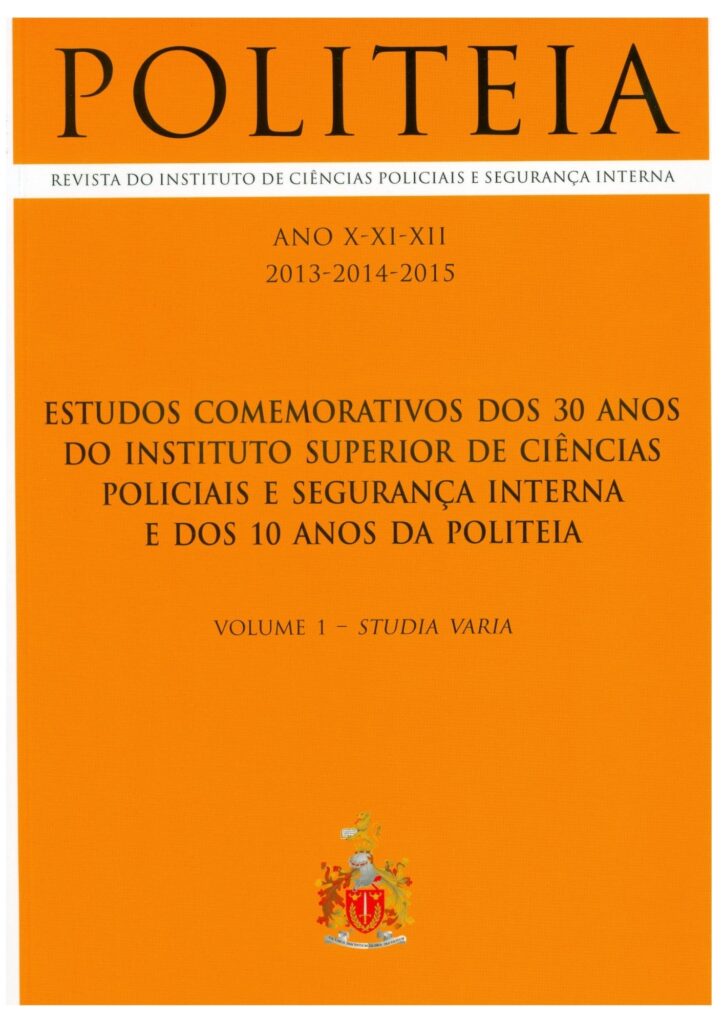Revolucionar ou Reajustar a Segurança Privada: Alterações e crítica à Lei n.º 34/2013, de 16 de Maio
Key Words
A par da alimentação e do conforto, a segurança foi desde sempre uma das prioridades do Homem. Em busca desse desígnio, desenvolveu mecanismos de defesa, passou a viver em sociedade e criou regras para disciplinar a vivência comunitária. No Ocidente e no final do Século XVIII, com a fundação da ideia e da criação dos Estados como hoje os conhecemos, centralizou-se nesta entidade colectiva, entre outros poderes, o monopólio de uso da força, característica que se conservou intocável até ao último quartel do século passado. Com a falência do Estado social (ou providência) e o surgimento do Estado regulador, muitas das tarefas essenciais para a comunidade passaram também a ser levadas a cabo por privados, entre elas a educação, os cuidados de saúde e a segurança. E se, quanto às duas primeiras, a aceitação por parte dos cidadãos, não foi imediata nem fácil, já no que toca à privatização da segurança a resistência foi e tem sido ainda maior. Ainda assim, especialmente no Ocidente, os Estados foram permitindo que os privados abarcassem algumas competências no que diz respeito à segurança. Portugal não constitui excepção à regra e, depois de alguns anos de actividade não regulamentada, em 1982 foi publicado o primeiro diploma regulador da segurança privada. Após um período de evolução e amadurecimento, que terá durado até aos primeiros anos da década de 2000, a segurança privada parece agora ter atingido a maturidade, algo a que não serão alheias as alterações introduzidas pelo anterior regime jurídico. Hoje, já com um novo regime jurídico, composto pela Lei n.º 34/2013, de 16 de Maio, a segurança privada abrange outras actividades e ganha competências, constituindo-se, cada vez mais, como complemento da segurança pública.
Along with the food and the comfort, safety has always been one of the human priorities. In pursuit of this objective, man developed self-preservation mechanisms, went to live in society and created rules to control the community life. In the West and in the late eighteenth century, with the creation of states as we know them today, the monopoly of security, among other powers, has been preserved untouched until the last quarter of this century. With the bankruptcy of the welfare state and the rise of the regulatory state, many of the essential tasks for the community have also been carried out by private companies or institutions, including education, health care and security. Although not easy, education and health care have been more opened to be managed by the private sector. Instead, the privatization of the security sector has seen much more resistance. Still, especially in the West, the states have delegated some of the security competences to private companies. Portugal is no exception to the rule and, after a few years of unregulated activity, in 1982 was published the first law regulating the private security. After the initial stages of development (evolution and maturation), which lasted until the early years of the 2000’s, the private security now seems to have reached maturity. Today, now with a new legal system, composed by Law no. 34/2013, of 16 may, private security encompasses other activities and competences, and becoming an increasingly complement to public safety.
Versão original
Versão original
Outros artigos nesta edição
-
Editorial
Manuel Monteiro Guedes Valente
-
O futuro numa década: Os desafios económicos e securitários de Portugal
Sónia M. A. Morgado and Sérgio Mendes
-
A Cidade do Rio de Janeiro e a Segurança – Os Jogos Olímpicos de 2016
Maria de Fátima Magalhães da Rocha
-
Revolucionar ou Reajustar a Segurança Privada: Alterações e crítica à Lei n.º 34/2013, de 16 de Maio
David Marcos Borralho Pereira
-
Clarificando o Conceito de Segurança
Luís Filipe Jorge de Almeida Guerra
-
Invasões Biológicas e Segurança: uma frente descurada? Bio invasions and Security: a neglected front?
Jorge Fonseca de Almeida
-
Os Serviços de Informações: Actividade, Organização, Poder e Controlo
Hélder Valente Dias
-
A radicalização salafista-jihadista na Europa: o caso dos imigrantes de segunda e terceira geração conectados com o Islão
Marina Soares
-
A dupla perspetiva da norma fundamental em Hans Kelsen
José Joaquim Monteiro Ramos
-
Regime jurídico do correio eletrónico: dos momentos do correio eletrónico…à consagração de uma proteção jurídica uniforme pela Lei do Cibercrime
Nuno Ricardo Pica dos Santos
-
Fórmula Típica do Artigo 241-C do ECA Cibernético: ecos do Direito Penal do Inimigo?
Stenio Santos Sousa
-
O Princípio da Liberdade – Princípio da Legalidade da Detenção nos Tribunais Internacionais
Maria João Simões Escudeiro
-
Produtos Explosivos: Procedimentos e Notas Jurídico-Policiais
Francisco António Carrilho Bagina
-
Direito à Proteção Familiar
Alberto Peixoto
-
A Responsabilidade Social das Empresas em Tempos de Crise. Milton Friedman Revisitado
Maria Augusta Teles
-
Stresse e Burnout em Agentes da Polícia de Segurança Pública
Nuno Russo
-
Revisitando a Galeria de Criminosos Célebres em Portugal. História da Criminologia Contemporânea (1896-1908)
Nuno Caetano Lopes de Barros Poiares




